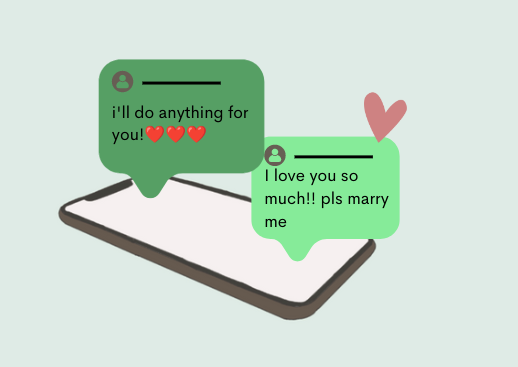Parasocial Relationships: The Line Between Fantasy and Reality

A phone is lit up with messages expressing love for a person (Photography by: Ally Espiritu).
A notification lights up your screen, announcing that your favorite influencer is about to go live. You quickly join the stream, excited to hear about their day. Hours pass by, punctuated by frequent chat messages expressing your laughter, disbelief, and support. At one point, the streamer even responds to your message, out of the hundreds of others, and makes you feel seen and strengthens the one-sided bond between you and the streamer.
This format of live streaming on major platforms like Twitch and YouTube makes it easy for people to talk directly to the streamer through the chat, and the informal nature of it makes interactions feel authentic and fluid. With the rise of technology pushing these streamers further into the forefront, the phrase ‘parasocial relationship’ has been thrown around across the internet. This phrase describes a one-sided relationship with a person who has no idea about the other person, the fan.
Some people are able to uphold a healthy parasocial relationship: looking to the person for entertainment but disconnecting from them when necessary, while many have delved into an unsafe area full of obsession and delusion. More often than not, parasocial fans have caused the streamer’s space to be unsafe for both the streamer and other fans due to their unhealthy connection.
“Idols are public figures, so, of course, they are gonna be obsessed over…basically they’re kinda consenting to it because their whole idea is to be loved by the masses,” said Huntington Beach High School (HBHS) junior student Katelynn Dang.
As Dang says, obsession over idols is inevitable, especially on the internet where not everyone can be controlled; however, there should still be some boundaries that celebrity figures have. Parasocial relationships can often spiral into extreme behaviors like kidnapping, stalking, and doxxing which is the leaking of private information, which crosses the boundaries of privacy.
Lynh Tran, a HBHS sophomore said, “I feel like streamers should have a persona, and not show too much of their real self.”
This is often the case for many celebrities as many try to hide emotions like anger or jealousy to keep their reputation. Although this is what they choose to display to the world, that does not mean that they are immune to those emotions. Many forget this aspect, causing them to be upset when they see parts of themselves that don’t fit the image that was put up for so long, and this entitlement has led to the recent increase in cancel culture.
Danger from parasocial relationships can occur when fans attach themselves to only a portion of the influencer’s personality. Nobody can truly know them just from what they put online because it is only a piece of who they are, and streamers also should not seek to completely understand their fans as well.
“At the end of the day, the streamers are there to put on a show and be entertaining and be there for somebody, not necessarily a pillar in someone’s life,” says Charlie, aka “moistcr1tikal,” a streamer on Twitch. Being able to understand this is an essential part of being able to maintain a healthy distance from celebrities.
“It’s entertaining, but for some people I think they’re just lonely,” says HBHS sophomore Katie Tran.
Having a parasocial relationship does not necessarily have to be a bad thing. Normally the phrase has a highly negative connotation online, but every fan upholds a parasocial connection to those they look up to. It is completely normal to be fans of celebrities, but one’s boundaries should always be respected as well.
Your donation will support the student journalists of Huntington Beach High School. Your contribution will allow us to cover our annual website hosting costs.
Thank you for supporting our program!


